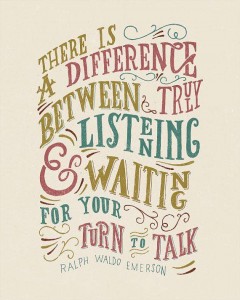For some period of my life I have believed that one of my best qualities is being able to always give advice to people. I considered that my judgement and empathy were remarkable, and therefore, my advice was so valuable and helpful to everyone. This changed when I got familiar with mindfulness and meditation, at first, I wasn’t aware of this, but when people approached me with their problems I didn’t know what to say to them and what advice to give. Maybe for the first time, I was actually listening and not paying attention to what should I say in order to make them feel better.
I truly believe that most of the people really want to help you when they give you some type of advice (even if it is not the best one), but in most of the cases, advice is usually something that we are not seeking for. I’ve begun to notice in communication with people that they appreciate more just my mindful presence and support when they are passing through a difficult phase, and actually my advice, opinion, comment is not so necessary.

Photo source: etsy.com
How can we be more mindful in communication?
- Be patient. We often jump to conclusion, make judgments about the situation or finish the sentence of the person cause we think we know him/her so well. It is normal that during the conversation we often can’t wait for our turn to speak, but, in this case, we should try to pause, bring our attention back to the speaker and listen carefully with an open attitude.
- Focus on what the person is saying. This includes being aware of what the person is saying, as well as their facial expression, gesture, body language and tone of their voice. If your mind wanders during the conversation, don’t feel bad-it happens to everyone, just gently bring your attention back to your speaker. This way you practice your awareness and listening skills.
- Pay attention to your nonverbal responses. The way you sit, lean your body,facial expressions and gestures you make are all important when listening to people, they can notice by observing your body language whether you are truly interested in what they have to say.
- Be receptive and understanding. Encourage the person to express himself/herself, listen with the willingness to understand, pause before answering and try to confirm and acknowledge what the person said, don’t hesitate to ask for clarification if there was something you didn’t understand.
- Practice meditation. I truly believe that my listening skills changed since I started to meditate, by practicing our awareness and attention we learn how to intentionally and authentically bring attention not just to ourselves but also to other people.
Next time when a person decides to share something with you, instead of jumping to conclusions or saying some advice which would “cheer them up instantly” try to pause, breathe, listen and be present.







